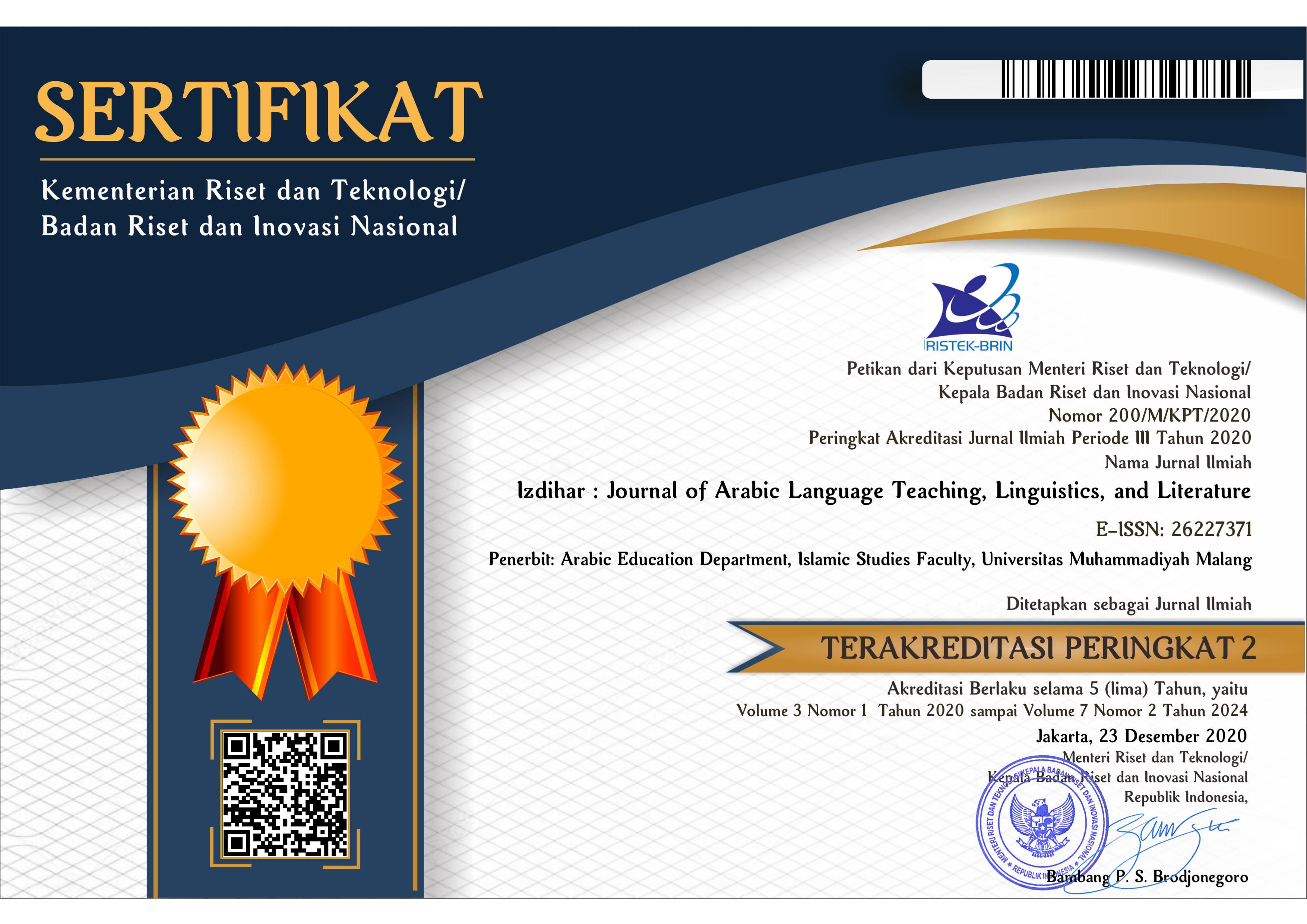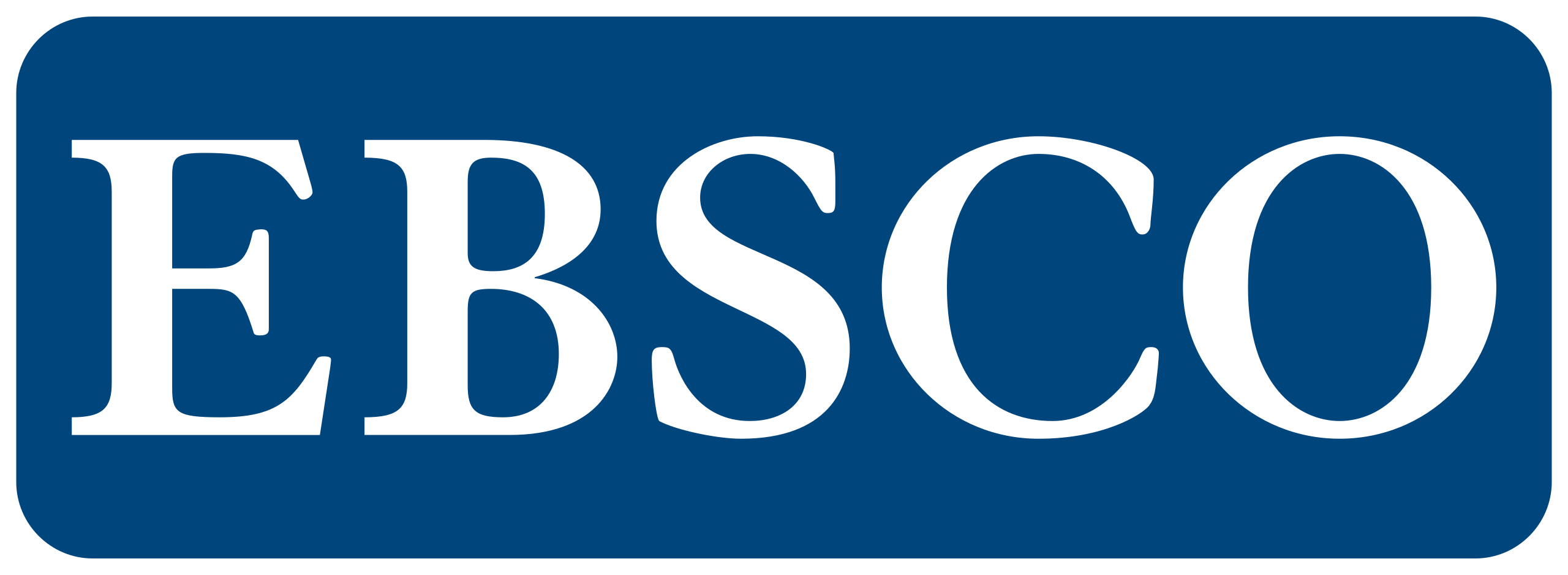Implementation of Integrative Arabic Grammar (Nahwu & Sharaf) Curriculum in Islamic Boarding School
DOI:
https://doi.org/10.22219/jiz.v3i3.13264Keywords:
Curriculum, Development, Integrative, Nahwu & Sharaf.Abstract
Learning Nahwu & Sharaf is considered a frightening subject by students in Islamic boarding schools and informal Islamic boarding schools. One of the reasons is that the institution's existing curriculum has not been planned and presented correctly. One of the institutions with an integrative curriculum to teach Nahwu & Sharaf subjects considered acceptable is the Darul Uluum Islamic Boarding School.This study aimed to describe Nahwu & Sharaf curriculum development concepts and models at Daarul Uluum Islamic boarding school at Majalengka supporting and inhibiting implementing the curriculum. The method used in this study was qualitative research. Data collection used interviews, the teacher's approach to teaching Nahwu & Sharaf, and the Islamic boarding school syllabus.The results showed that Nahwu & Sharaf curriculum development model was a central de-central, which combined two administrative approaches and the grassroots approach. The supporting factors were: 1) Motivation of leaders of Islamic boarding school; 2) Commitments of leaders of Islamic boarding schoolto develop curriculum, 3) Professional competence of Nahwu & Sharaf teachers, and 4) Input of students who have an initial understanding of the material to be obtainable. The inhibiting factors were: 1) the lack of individual funding allocations; 2) the teacher has not been able to properly teach students the material in Nahwu & Sharaf syllabus; 3) the unequal ability of teachers to teach in class Nahwu & Sharaf subjects; and 4) students feel bored while studying in class.Downloads
References
Abidin, Z., & Satrianingsih, A. (2017). Perkembangan dan Masa Depan Bahasa Arab. Diwan : Jurnal Bahasa Dan Sastra Arab. 3(2). 141-154 DOI: https://doi.org/10.24252/diwan.v3i2.4459.
Albantani, A. M. (2015). Implementasi Kurikulum 2013 Pada Pembelajaran Bahasa Arab Di Madrasah Ibtidaiyah. Arabiyat : Jurnal Pendidikan Bahasa Arab Dan Kebahasaaraban. 2(2). 178-191 DOI: https://doi.org/10.15408/a.v2i2.2127.
Aliyah, A. (2018). Pesantren Tradisional Sebagai Basis Pembelajaran Nahwu Dan Sharaf Dengan Menggunakan Kitab Kuning. Al-Ta’rib : Jurnal Ilmiah Program Studi Pendidikan Bahasa Arab IAIN Palangka Raya. 6(1). 1-25. DOI: https://doi.org/10.23971/altarib.v6i1.966.
Ardiansyah, A. A. (2020). Trial Use of Inquiry Methods in Learning to Write Arabic in Junior High School Santi Asromo Majalengka. Alsuna: Journal of Arabic and English Language, 3(1), 56–65. DOI: https://doi.org/10.31538/alsuna.v3i1.706
Fahrurrozi, A. (2014). Pembelajaran Bahasa Arab : Problematika Dan Solusinya. ARABIYAT: Jurnal Pendidikan Bahasa Arab Dan Kebahasaaraban. 1(2). 161-180. DOI: https://doi.org/10.15408/a.v1i2.1137
Fatoni, A. (2019). Arabic Learning for Academic Purposes. Izdihar : Journal of Arabic Language Teaching, Linguistics, and Literature, 2(2), 149-164. DOI: https://doi.org/10.22219/jiz.v2i2.10096.
Fransisca, T. (2015). Konsep I’rab dalam Ilmu Nahwu. Al Mahāra: Jurnal Pendidikan Bahasa Arab. 1(1). 79-99. DOI: https://doi.org/10.14421/almahara.2015.011-04.
Habibi, B. Y. (2019). Integrasi Kurikulum Bahasa Arab Pesantren Tradisional Dan Modern Di Madrasah Aliyah Program Keagamaan. Journal of Arabic Studies, 4(2), 151–167. DOI: http://dx.doi.org/10.24865/ajas.v4i2.178
Hidayat, A., & Rahmah, S. N. (2020). Relevansi Thariqah Qawaid-Tarjamah pada Perguruan Tinggi. Tatsqifiy: Jurnal Pendidikan Bahasa Arab, 1(1), 47-56. DOI: https://doi.org/10.30997/tjpba.v1i1.2575.
Himmah, R. H., & Amrulloh, M. A. (2018). Pengembangan Kurikulum Bahasa Arab Pesantren Mu’adalah (Studi Kasus di Pondok Pesantren Al-Kausar Genteng Banyuwangi). Jurnal Al Bayan: Jurnal Jurusan Pendidikan Bahasa Arab. 9(2). 234-248. DOI: https://doi.org/10.24042/albayan.v9i2.2240.
Khasanah, N. (2018). Desain Pengembangan Kurikulum Pembelajaran Bahasa Arab Berbasis Pendekatan Potensi/ Fitrah. Al Mahāra: Jurnal Pendidikan Bahasa Arab, 4(2), 159–180. DOI: https://doi.org/10.14421/almahara.2018.042-01.
Mivtakh, B. A. (2019). Arabic Language Neologism on the Field of Technology in al-Akhbar Newspaper. Izdihar : Journal of Arabic Language Teaching, Linguistics, and Literature, 2(1), 17-34. DOI: https://doi.org/10.22219/jiz.v2i1.7553
Mubarok, M. H. (2018). METODE PEMBELAJARAN SHOROF DI PONDOK PESANTRENSUKAHIDENG, SUKARAME, KABUPATEN TASIKMALAYA. THORIQOTUNA, 1(2), 38–49. http://jurnal.iailm.ac.id/index.php/thoriqotuna/article/view/107
Muhtifah, L., & Muskania, R. T. (2019). The Design on Quality System Model of FTIK IAIN Pontianak in SNPT 2015 and QMS ISO 9001:2015. Jurnal Pendidikan Islam. 7(2). 383-404. DOI: https://doi.org/10.14421/jpi.2018.72.383-404.
Muhzin Nawawi, M. N. (2017). Pengembangan Kurikulum Pendidikan Bahasa Arab. An Nabighoh Jurnal Pendidikan Dan Pembelajaran Bahasa Arab, 19(1), 85-106. DOI: https://doi.org/10.32332/an-nabighoh.v19i1.759.
Mukmin, M., & Ghofur, A. (2018). Tahlîl Al-Akhtâ’ Al-Nahwiyyah Fî Qirâah Kutub Al-Turots ‘Inda Al-Talâmîdz Bi Ma’had Al-Falah Al-Salafi Banyuasin. Taqdir. 4(1). 1-17. DOI: https://doi.org/10.19109/taqdir.v4i1.2282
Musthafa, I., & Hermawan, A. (2018). Metodologi Penelitian Bahasa Arab (Konsep Dasar, Strategi, Metode, Teknik). Bandung: PT Remaja Rosakarya.
Najah, M. (2019). Penerapan Pembelajaran Shorof Bagi Pembelajar Tingkat Pemula Menggunakan Metode Pemerolehan Bahasa. Al Mahāra: Jurnal Pendidikan Bahasa Arab. 5(1) 117-140. DOI: https://doi.org/10.14421/almahara.2019.051-07.
Nasution, S. (2016). Pengembangan Kurikulum Bahasa Arab Di Madrasah Berbasis Karakter. Bahasa Dan Seni: Jurnal Bahasa, Sastra, Seni Dan Pengajarannya. 44(2). 135-148. DOI: https://doi.org/10.17977/um015v44i22016p135.
Nawali, A. K. (2018). Dampak Penerapan Kurikulum Kementerian Agama dan Kurikulum Pesantren Terhadap Peningkatan Hasil Belajar PAI di MAN YOGYAKARTA. Al-Ikhtibar: Jurnal Ilmu Pendidikan, 5(1), 555–575. DOI: https://doi.org/10.32505/ikhtibar.v5i2.550
Noor, F. (2018). Kurikulum Pembelajaran Bahasa Arab di Perguruan Tinggi. Arabiyatuna : Jurnal Bahasa Arab. 2(1). 1-22. DOI: https://doi.org/10.29240/jba.v2i1.305.
Nurjannah, N. (2018). Analisa Kebutuhan Sebagai Konsep Dasar dalam Pengembangan Kurikulum Bahasa Arab di MAN Curup. Arabiyatuna : Jurnal Bahasa Arab. 2(1). 49-72. DOI: https://doi.org/10.29240/jba.v2i1.409.
Qodri, M. (2019). Arabic Language Test in the Perspective of Competency-Based Curriculum for Students of Madrasah Aliyah Negeri 3 Malang. Izdihar : Journal of Arabic Language Teaching, Linguistics, and Literature, 2(2), 115-134. DOI: https://doi.org/10.22219/jiz.v2i2.10003.
Rahmat, A. S., & Abdurrahman, M. (2017). Analysis of Nahwu Learning Progress in Indonesian Universities Based on the Character of Value Concerns. TAWARIKH International Journal for Historical Studies. 8(2). 189-202. https://mindamas-journals.com/tawarikh/article/view/827
Syaifullah, M., & Izzah, N. (2019). Kajian Teoritis Pengembangan Bahan Ajar Bahasa Arab. Arabiyatuna : Jurnal Bahasa Arab. 3(1). 127-144. DOI: https://doi.org/10.29240/jba.v3i1.764.
Thohir, M. (2020). The Implementation of Sharf Learning Using KH. Muhammad Yusuf’s Method at Terbuka Junior High School Wanar Lamongan/Penerapan Pembelajaran Sharf dengan Menggunakan Metode KH Muhammad Yusuf di SMP Terbuka Wanar Lamongan. Al Mahāra: Jurnal Pendidikan Bahasa Arab, 6(2), 217–240.DOI: https://doi.org/10.14421/almahara.2020.062.04
Wahab, M. A. (2015). Pembelajaran Bahasa Arab Di Era Posmodern. ARABIYAT : Jurnal Pendidikan Bahasa Arab Dan Kebahasaaraban. 2(1). 59-74. DOI: https://doi.org/10.15408/a.v2i1.1519.
Wahyono, I. (2019). Strategi Kiai Dalam Mensukseskan Pembelajaran Nahwu Dan Shorof Di Pondok Pesantren Al-Bidayah Tegalbesar Kaliwates Jember. Tarbiyatuna : Kajian Pendidikan Islam. 3(2). 106.121. DOI: https://doi.org/10.29062/tarbiyatuna.v3i2.262.
Wekke, I. S. (2015). Tradisi Pesantren Dalam Konstruksi Kurikulum Bahasa Arab Di Lembaga Pendidikan Minoritas Muslim Papua Barat. Karsa: The Journal of Social and Islamic Culture. 22(1). 22-39. DOI: https://doi.org/10.19105/karsa.v22i1.549.
Yusuf, E. (2018). Implementasi Kurikulum Bahasa Arab Di Perguruan Tinggi Agama Islam (PTAI) Di Indonesia. Tarling : Journal of Language Education. 1(1). 42-61. DOI: https://doi.org/10.24090/tarling.v1i1.1121.
Yusuf, M. (2019). Kajian Teoritik Pengembangan Pembelajaran Bahasa Arab Berbasis Humanistik Di Madrasah Ibtida’iyah. Shaut Al Arabiyyah, 7(2), 132-146. DOI: https://doi.org/10.24252/saa.v7i2.10752.
Zubaidi, A. (2015). Model-Model Pengembangan Kurikulum Dan Silabus Pembelajaran Bahasa Arab. Cendekia: Jurnal Kependidikan Dan Kemasyarakatan. 13(1). 107-121. DOI: https://doi.org/10.21154/cendekia.v13i1.240.
Zulfa, N. C., & Pardjono, P. (2013). Manajemen Kurikulum Madrasah Aliyah Program Keagamaan Man 1 Surakarta. Jurnal Akuntabilitas Manajemen Pendidikan. 1(2). 219-234. DOI: https://doi.org/10.21831/amp.v1i2.2396.
Zulkifli, M. (2018). Analisis Bentuk Evaluasi Kurikulum 2013 Mata Pelajaran Bahasa Arab Di Mi. Al-Madrasah: Jurnal Pendidikan Madrasah Ibtidaiyah. 2(2). 125-143. DOI: https://doi.org/10.35931/am.v0i0.29.
Downloads
Published
How to Cite
Issue
Section
License
Copyright Notice
Authors who publish with this journal agree to the following terms:
- Authors retain copyright and grant the journal right of first publication with the work simultaneously licensed under a Creative Commons Attribution-ShareAlike 4.0 International License that allows others to share the work with an acknowledgment of the work's authorship and initial publication in this journal.
- Authors are able to enter into separate, additional contractual arrangements for the non-exclusive distribution of the journal's published version of the work (e.g., post it to an institutional repository or publish it in a book), with an acknowledgment of its initial publication in this journal.
- Authors are permitted and encouraged to post their work online (e.g., in institutional repositories or on their website) prior to and during the submission process, as it can lead to productive exchanges, as well as earlier and greater citation of published work (See The Effect of Open Access).
Copyright (c) 2019 Izdihar : Journal of Arabic Language Teaching, Linguistics, and Literature

This work is licensed under a Creative Commons Attribution-ShareAlike 4.0 International License.

















